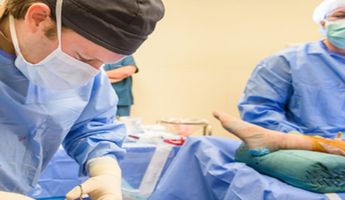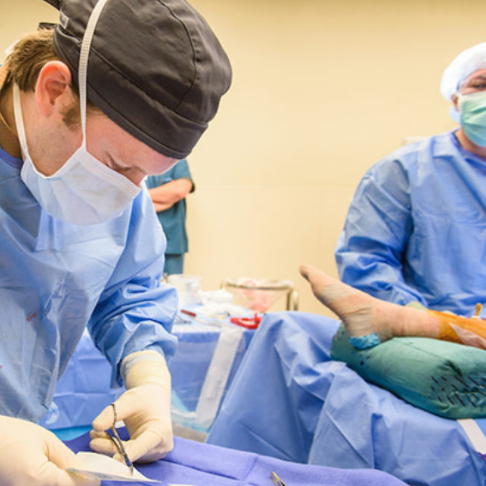Tendon Repair in Georgia
Search and Compare the Best Clinics and Doctors at the Lowest Prices for Tendon Repair in Georgia

Find the best clinics for Tendon Repair in Georgia
No clinics available
Russian Federation offers the best prices Worldwide
Price: $ 828

- Home
- Georgia
WHY US?
At Medijump, we're making medical easy. You can search, compare, discuss, and book your medical all in one place. We open the door to the best medical providers worldwide, saving you time and energy along the way, and it's all for FREE, no hidden fees, and no price markups guaranteed. So what are you waiting for?

Free

Best Price

Widest Selection

Risk-Free
What you need to know about Tendon Repair in Georgia

Tendon repair is a surgical procedure to treat a torn or damaged tendon – the soft stretchy tissues that connect muscles to the bone and helps to protect joints from damage. The purpose of Tendon Repair is to restore normal movement to a joint as tendon injuries are very painful and can make it difficult to move. Tendon repair is mostly performed on people with a deep cut that severs a tendon, an injury, or tears due to rheumatoid arthritis, or an injury from contact sports.
What does a Tendon Repair Procedure Involve?
Tendon repair surgery can be performed under local, regional, or general anesthetic, depending on your medical history and the location of the affected tendon. The procedure starts by making an incision in the skin over the injured tendon, then any damaged tendon is removed and the ends of the torn tendon are sewed together. The final step is closing the incision with sutures and covering the area with sterile dressing or bandages.
How Long Should I Stay in Georgia for a Tendon Repair Procedure?
Although tendon repairs are usually performed as an outpatient procedure (meaning you can leave the hospital on the same day of the surgery), you should aim to stay in Georgia for 5 to 7 days. As you will need to attend follow-up hospital checkups where your surgeon will remove the stitches and monitor your healing
What's the Recovery Time for Tendon Repair Procedures in Georgia?
The total period for recovery can take around 12 weeks, but you should rest for 6 weeks to aid a speedy recovery. Make sure to ask your doctor about the recovery timeline. Also, remember that you should avoid doing any exercises (including therapy exercises) until your surgeon allows you to do so.
What sort of Aftercare is Required for Tendon Repair Procedures in Georgia?
Your surgeon will give you aftercare instructions, which may include wound care and dietary restrictions. For the first few days following the surgery, make sure to keep the affected area elevated to avoid swelling and pain. Your surgeon may also recommend physical therapy or occupational therapy exercises to regain your range of motion.
What's the Success Rate of Tendon Repair Procedures in Georgia?
The sooner the procedure is carried out after injury, the higher the success rate. However, there are some minor side effects and risks associated with the procedure, including loss of joint use, re-tearing of the tendon, stiffness of the joint, scar tissue, as well as problems with anesthesia.
Are there Alternatives to Tendon Repair Procedures in Georgia?
Physical therapy can be an alternative if you do not want to undergo surgery, but in some severe cases, you need both surgery and physical therapy to treat your damaged tendon effectively.
What Should You Expect Before and After the Procedure
Before a Tendon repair, your movement and mobility may be limited as it can be very painful for you to move a joint. After the surgery, you should slowly regain your range of motion. Once you have recovered fully, you may be able to move like you used to before the damage to your tendon.
Whilst the information presented here has been accurately sourced and verified by a medical professional for its accuracy, it is still advised to consult with your doctor before pursuing a medical treatment at one of the listed medical providers
No Time?
Tell us what you're looking for and we'll reachout to the top clinics all at once
Enquire Now

Popular Procedures in Georgia
Prices Start From $1,376

Prices Start From $125

Prices Start From $2,050

Prices Start From $15

Recommended Medical Centers in Georgia for procedures similar to Tendon Repair

- Interpreter services
- Translation service
- Religious facilities
- Medical records transfer
- Medical travel insurance
- Health insurance coordination
- TV in the room
- Safe in the room
- Phone in the room
- Private rooms for patients available

- Interpreter services
- Translation service
- Religious facilities
- Medical records transfer
- Medical travel insurance
- Health insurance coordination
- TV in the room
- Safe in the room
- Phone in the room
- Private rooms for patients available

- Interpreter services
- Translation service
- Religious facilities
- Medical records transfer
- Medical travel insurance
- Health insurance coordination
- TV in the room
- Safe in the room
- Phone in the room
- Private rooms for patients available

- Interpreter services
- Translation service
- Religious facilities
- Medical records transfer
- Medical travel insurance
- Health insurance coordination
- TV in the room
- Safe in the room
- Phone in the room
- Private rooms for patients available
Tendon Repair in and around Georgia
Introduction
Georgia is located in the Caucasus region of Eurasia and it is the most visited country in South Caucasus. From its green valleys and vineyards to its old watchtowers and old churches, this country will never disappoint. Over the last 5 years, Georgia has been visited by an increasing number of medical tourists. These foreign patients, mostly come from Saudi Arabia, Kuwait, Iraq, and Russia, are attracted to Georgia’s high-quality and affordable medical care, as well as the medical center’s first-class services. Most of these patients come for dental treatments, cosmetic surgery, oncology, radiology, liver and kidney transplantation, bone marrow transplantation, orthopedics, infertility treatment, and bariatric surgery.
Popular Cities and Regions in Georgia
Georgia’s vibrant capital, Tbilisi, offers picturesque Old Town, outstanding architecture, dramatic valley setting, and terrific cuisine. Home to 30% of the country’s population, this city is lively and filled with hipster culture and techno scene. One of the most famous monuments in the city is Kartlis Deda, which is a 20-meter tall aluminum symbol of Tbilisi. Another popular city is Batumi, which is the country’s most charming seaside destination. Its synthesis of the mountain and the sea is truly unique and interesting. The most popular attractions in this city, besides its beach, are Batumi Boulevard, Batumi Botanical Garden, Medea Monument, Ortajame Mosque, and Batumi Archeological Museum.
Transport in Georgia
International tourists will arrive in Tbilisi International Airport. It serves flights to and from several cities in Europe, the Middle East, and Asia. There are numerous budget airlines that operate flights from this airport, including IndiGo, Ryanair, and AirAsia X. To travel around the country, domestic flights, buses, and trains are available. To get around major cities, several public transportation options are available. The most common way to get around is by local minibus and buses. Taxis are widely available, but make sure to agree on the fare before getting on.
Visas in Georgia
Georgia allows citizens of 98 countries, including all European Union countries, the US, Japan, and Australia, to stay for a year. Holders of passports issued by 66 countries, such as Bolivia and Egypt, are eligible to apply for e-Visa. The e-Visa is valid for 90 days per 180-day period and 30 days per 120-day period. Citizens of other countries, such as Sudan and Morocco, need to apply for a visa in advance.
Weather in Georgia
Winter in Georgia is usually very cold, with temperatures ranging from 2°C to 6°C, and sometimes dropping below 0°C at night. Summer, from June to August, is pleasantly warm with average temperatures of 20°C to 30°C. However, some coastal areas are humid during this season. Spring and Autumn are delightful as the weather is not too hot, nor too cold. Both of these seasons see frequent rainfalls.
Additional Info
- Local Currency: Lari (GEL) is the official currency of Georgia. 1 USD is equivalent to 2.7 GEL.
- Money & Payments: ATMs are easily available and credit cards are accepted in most restaurants, shops, and hotels. However, if you travel outside of Tbilisi, it’s best to bring plenty of cash. Tipping is expected.
- Local Language: Georgian is the official language. Russian is common, while English is becoming more widespread.
- Local Culture and Religion: The majority of Georgia’s population is Christian. Other religions, including Islam, Judaism, and Bahá'í Faith are present.
- Public holidays: Some of the most celebrated public holidays are New Year’s Day, Orthodox Christmas, Great Saturday, Day of Victory over Fascism, and Independence Day.
Popular Searches
- Plastic Surgery in Thailand
- Dental Implants in Thailand
- Hair Transplant in Thailand
- Breast Augmentation Thailand
- Gastric Sleeve in Thailand
- Gender Reassignment Surgery in Thailand
- Laser Hair Removal in Bangkok
- Botox in Bangkok
- Dermatology in Bangkok
- Breast Augmentation in Bangkok
- Coolsculpting in Bangkok
- Veneers in Turkey
- Hair Transplant in Turkey
- Rhinoplasty in Turkey
- Stem Cell Therapy in Mexico
- Rhinoplasty in Mexico
- Liposuction in Mexico
- Coolsculpting in Tijuana
- Rhinoplasty in Korea
- Scar Removal in Korea
- Gastric Sleeve in Turkey
- Bone Marrow Transplant in India
- Invisalign in Malaysia
- Plastic Surgery in the Dominican Republic
- Tummy Tuck in the Dominican Republic
- Plastic and Cosmetic Surgery in Poland
- Rhinoplasty in Poland
- Hair Implant in Poland
- Dental Implants in Poland
- IVF in Turkey